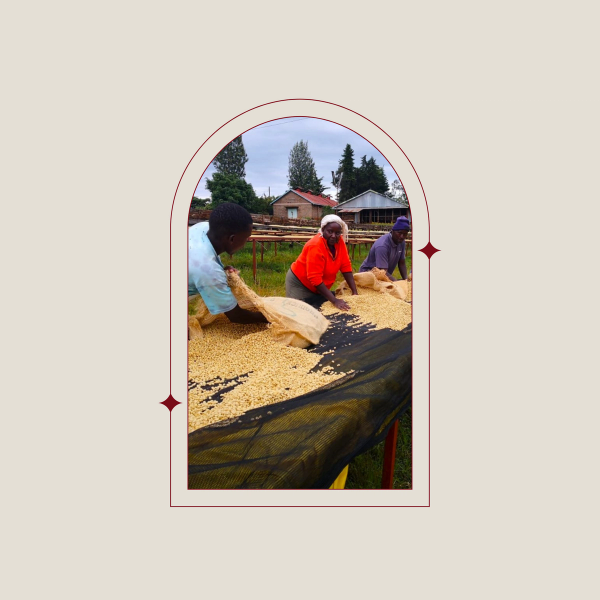Day 7
8 oz. Tin — $22
This is a traditional double-washed coffee from Nyeri, Kenya, produced by smallholders organized around the Rumukia Cooperative Society. This full bodied coffee is very sweet with flavors of ripe plum, cherry tomatoes, toffee and blackberry. The whole bean coffee is valve sealed to retain peak freshness and flavor. The decorative holiday can is 100% curbside recyclable or better yet, endlessly reusable!
Tasting Notes
- Plum
- Sweet Cherry Tomato
- Toffee
- Blackberry Compote
Details
Origin
Nyeri County, KenyaProcess
Double WashedElevation
1625 - 1700 maslVarietal
SL34 & SL28Green Cost
$9.50/lbSourcing & Processing
This coffee was grown in Nyeri on the edge of the national forests surrounding the peak of Mt. Kenya in the country's Central Province. This stratovolcano is the second tallest peak on the continent of Africa and a commanding natural presence. The high elevation forests have a wet climate and mineral rich volcanic soil.
Rumukia (New Rumukia Farmers Cooperative Society) is one of Nyeri’s smaller coop societies, at just under 1200 members and three washing stations aka factories: Thunguri, Gaikundu, and Kagunyu.
Rumukia is also one of the region’s oldest societies, beginning their operations in 1979. Processing here happens in much the same way as it has for decades, with a unique post-processing clean water soak acting as an additional washing step. This procedure has two-fold benefits, in that it can pragmatically help to delay moving coffee from the pulpery to the drying tables if there is a limitation on available drying space, and it also provides a measure of quality improvement identified by academic researchers and coffee tasters alike.
During wet processing, coffee cherries are pulped leaving a layer of mucilage, which contains sugars and other nutrients. The pulped cherries are left for 24 hours to allow for fermentation. This allows the beans to soak up the sugars impacting the delicious flavors into the beans.
After fermentation, the coffee goes through washing channels at least three times. This process serves two purposes: 1) it helps remove mucilage and 2) grades the parchment coffee quality based on density. The beans that sink are separated from the ones that float. After this washing process, the parchment coffee is soaked in tanks for another 24 hours to clean off any remaining mucilage. The coffee is then ready for drying.
12 Days of Coffee - Rwanda

Grace brews up some of the Day 9 - Rwanda A Rugali Anaerobic Natural on a Chemex brewer and it is so scrumptious.
Earn points on every purchase
Join the Brew Club
Need a last-minute gift?
Give the gift that keeps on giving
Make your holiday gifts count at home and at origin, with our exquisite selection of limited edition roasts.

Small lot coffees curated with you in mind
Unique small-lot coffees from our globe-spanning network of artisan producers, roasted to perfection and delivered to you each month.
Plus, if you choose an annual plan*, we’ll send you amazing brew gear like the Fellow Stagg EKG kettle or a Moccamaster brewer for free.
*First annual plan only



